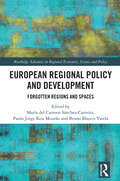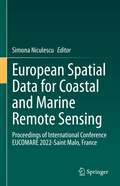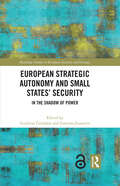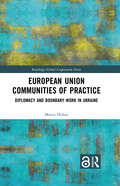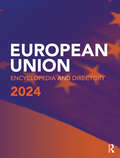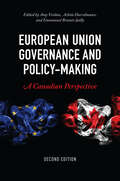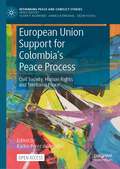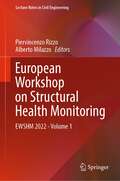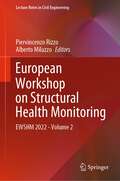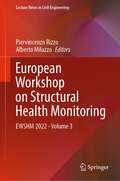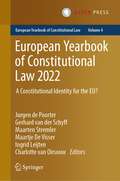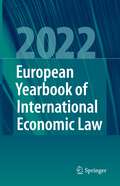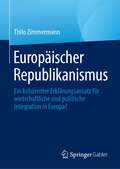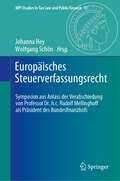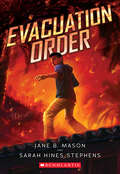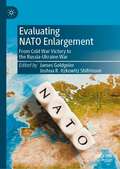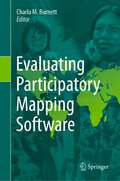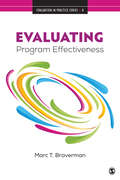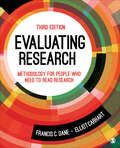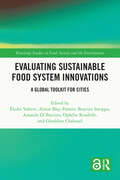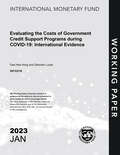- Table View
- List View
European Regional Policy and Development: Forgotten Regions and Spaces (Routledge Advances in Regional Economics, Science and Policy)
by María del Carmen Sánchez-Carreira Paulo Jorge Reis Mourão Bruno Blanco-VarelaThe shortcomings of traditional regional policies led to a major policy. Thus, regions have become more active in the design and implementation of policies, following a bottom-up approach and involving the participation of the local community in strategic planning, as opposed to the traditional top-down method. This book addresses regional development theories and policies, with a special focus on forgotten places, and raises emerging questions about recent theoretical advances, as well as trends and challenges in the field. It examines two main and related issues: the crucial role of regional actors for development and the role of Forgotten Spaces. It emphasizes the spatial/territorial approaches from different theoretical perspectives, underlining place-based approaches and compares the experiences of both successful and failed cases, attempting to identify lessons and policy recommendations, as well as adding empirical evidence to this field. The different cases presented, which focus on Forgotten Spaces, allow the reader to assess the role of different actors for regional development as well as some sectoral approaches. While there is a clear focus on European countries with different geographical, institutional and sociocultural characteristics, the book also examines good and bad examples of regional development and policies related to forgotten places from different regions worldwide, including developed and developing countries. The book benefits from contributions from over 20 authors from different nationalities, and a rich diversity of case studies, approaches and methods of discussion. The authors discuss practical examples and more complex theoretical approaches, involving techniques of spatial analysis, spatial econometrics, social networks, content analysis as well as regional planning techniques. The book will appeal to an interdisciplinary audience and will provide academicians, politicians, and policy designers with original and detailed analyses.
European Spatial Data for Coastal and Marine Remote Sensing: Proceedings of International Conference EUCOMARE 2022-Saint Malo, France
by Simona NiculescuThis volume presents full paper contributions from the International Conference of European Spatial Data for Coastal and Marine Remote Sensing (EUCOMARE) 2022, with the support of the ERASMUS+ Programme of the European Union, held in Saint Malo, France. EUCOMARE aims to promote academic and technical exchange on coastal related studies including coastal environmental and socio-economic issues, with the use of European remotely sensed data. The book is an excellent resource for scientists, engineers, and programme managers eager to learn about the recent developments and achievements in the field of remote sensing applications on marine and coastal areas. Readers will learn about recent advances in sensors' radiometric, spatial, temporal and spectral resolution, as well as new data processing approaches in remote sensing for monitoring and mapping the various characteristics of marine, coastal and aquatic systems.
European Strategic Autonomy and Small States' Security: In the Shadow of Power (Routledge Studies in European Security and Strategy)
by Justinas Juozaitis Giedrius ČesnakasThis book analyses whether the EU’s drift towards European strategic autonomy presents a challenge or a window of opportunity for its small member states to advance their security interests. The volume presents small states’ perceptions of European strategic autonomy, highlighting their expectations and concerns. The chapters focus on the depth and breadth of European strategic autonomy, national security considerations, assessment of the impact on transatlantic relations, the expected outputs, and its potential impact on the EU’s institutional structure. It also shows how systemic circumstances and the interests of powerful states, either belonging to the EU (France, Germany, and Poland) or having a significant say in European security architecture (the US), establish opportunities and constraints for the small states to shape European strategic autonomy. In particular, the study focuses on the diverging interests of the Baltic states (Estonia, Latvia, and Lithuania), Belgium, Denmark, Greece, Hungary, and the Netherlands. It demonstrates that, in most cases, European strategic autonomy is perceived not as an alternative to NATO but as a supplementary element that could facilitate the development of national military capabilities, indigenous defence industries and resilience to non-military threats. Ultimately, the book suggests that national approaches towards European strategic autonomy mainly stem from pragmatic national security and foreign policy considerations, while largely ignoring grand strategic ideas. This book will be of much interest to students of European politics, security studies, and international relations.
European Union Communities of Practice: Diplomacy and Boundary Work in Ukraine (ISSN)
by Maren HofiusThis book provides a practice-based analysis of European Union (EU) diplomacy and community-building. Unlike studies focusing on how EU community-building proceeds centrally in Brussels, this book turns to EU diplomacy in its bordering state of Ukraine. At a time when the EU’s internal cohesion is being put to the test, this book provides novel insights into how feelings of belonging are produced amongst its members in the absence of a homogenous ‘we’. Transcending the traditional dichotomy between macro-structures and micro-processes of interaction, the book demonstrates that the EU’s large-scale community depends for its existence on practical instantiations of community-building in distinct ‘communities of practice’. Using the case of an EU diplomatic ‘community of practice’ in Kyiv, Ukraine, takes these questions to the EU’s margins, highlighting that the boundaries of community are key sites in which community materialises. The in-depth case study identifies diplomats’ ‘boundary work’ as the constitutive rule that makes the local ‘community of practice’ cohere and create feelings of belonging to the large-scale polity of the EU. This book will be of interest to researchers of European studies, as well as to those working on global cooperation and international relations more broadly.
European Union Encyclopedia and Directory 2024 (The European Union Encyclopedia and Directory)
by European UnionThoroughly updated, this extensive reference source provides in-depth information on all matters relating to the European Union (EU): EU energy policy in the context of the Russian Federation’s invasion of Ukraine is covered in depth, as is the impact of the COVID-19 crisis on EU policy; EU citizenship after Brexit is discussed, together with EU migration policy and the EU’s social framework; EU-Africa relations are reviewed, and current issues in overall foreign policy and security are addressed.Key Features: an up-to-date chronology of the EU from 1947 to present an A-Z section contains definitions and explanations of organizations, acronyms and terms, and articles on each member state. Comprising some 1,000 entries, terms listed include: Brexit; the European Institute for Gender Equality; Next Generation EU; REPowerEU; and Team Europe articles written by experts on the EU provide an overview of its policies and activities a directory of principal names, addresses, telephone numbers, and e-mail and internet addresses of all major European Union institutions and their official bodies. This information is supplemented by summaries of important treaties, and details of EU-level trade and professional associations. Users will also find details of MEPs and the political groups and national parties contributing to the European Parliament a statistical survey gives tables covering: population, employment, agriculture, energy and mining, industry, the environment, finance, trade, transport and communications, tourism, health and welfare, and education across the EU This title will prove valuable to academic and public libraries, politicians and government agencies and the media, as well as to all those in need of accurate and reliable information on the European Union.
European Union Governance and Policy-Making, Second Edition: A Canadian Perspective
by Amy Verdun Emmanuel Brunet-Jailly Achim HurrelmannEuropean Union Governance and Policy-Making introduces the politics of the European Union (EU) to a student audience. The book is explicitly written for students enrolled in universities in Canada, or other non-EU countries, and builds on their academic background. Chapters cover the political and legal system of the EU, theories of European integration, core EU policies such as the Single Market, its single currency, migration policy, EU enlargement, as well as pressing issues facing the further development of European integration. This second edition has been comprehensively revised and updated to include a discussion of Brexit, the European Green Deal, COVID-19, and the Russian invasion of Ukraine. Written by leading Canadian scholars in the field of European integration, as well as international experts with teaching experience in Canadian universities, this textbook leverages the comparison to Canada and its federal system to help students understand what is unique about the European Union.
European Union Support for Colombia's Peace Process: Civil Society, Human Rights and Territorial Peace (Rethinking Peace and Conflict Studies)
by Karlos Pérez de ArmiñoThis open access book provides a comprehensive analysis of the EU's crucial support for the implementation of the Havana Peace Agreement between the Colombian government and the FARC-EP. It explores the use of new approaches and instruments that, despite some limitations and criticisms, could go beyond conventional liberal peace and provide useful lessons. Particular attention is paid to three axes: strengthening civil society, protection of human rights and a territorial peace perspective, as a contribution to the "local turn" in peace policies. The book first outlines the background of the conflict, the EU's two-decade defense of a negotiated peace, and the complexities of the peace process. Then, it analyses the development cooperation and political support provided in different areas: the collective reinsertion of ex-guerrillas, women and gender initiatives, the rights of ethnic communities, the sophisticated transitional justice system, as well as activities on reconciliation, victims and protection of human rights defenders.
European Workshop on Structural Health Monitoring: EWSHM 2022 - Volume 1 (Lecture Notes in Civil Engineering #253)
by Piervincenzo Rizzo Alberto MilazzoThis volume gathers the latest advances, innovations, and applications in the field of structural health monitoring (SHM) and more broadly in the fields of smart materials and intelligent systems, as presented by leading international researchers and engineers at the 10th European Workshop on Structural Health Monitoring (EWSHM), held in Palermo, Italy on July 4-7, 2022. The volume covers highly diverse topics, including signal processing, smart sensors, autonomous systems, remote sensing and support, UAV platforms for SHM, Internet of Things, Industry 4.0, and SHM for civil structures and infrastructures. The contributions, which are published after a rigorous international peer-review process, highlight numerous exciting ideas that will spur novel research directions and foster multidisciplinary collaboration among different specialists.
European Workshop on Structural Health Monitoring: EWSHM 2022 - Volume 2 (Lecture Notes in Civil Engineering #254)
by Piervincenzo Rizzo Alberto MilazzoThis volume gathers the latest advances, innovations, and applications in the field of structural health monitoring (SHM) and more broadly in the fields of smart materials and intelligent systems, as presented by leading international researchers and engineers at the 10th European Workshop on Structural Health Monitoring (EWSHM), held in Palermo, Italy on July 4-7, 2022. The volume covers highly diverse topics, including signal processing, smart sensors, autonomous systems, remote sensing and support, UAV platforms for SHM, Internet of Things, Industry 4.0, and SHM for civil structures and infrastructures. The contributions, which are published after a rigorous international peer-review process, highlight numerous exciting ideas that will spur novel research directions and foster multidisciplinary collaboration among different specialists.
European Workshop on Structural Health Monitoring: EWSHM 2022 - Volume 3 (Lecture Notes in Civil Engineering #270)
by Piervincenzo Rizzo Alberto MilazzoThis volume gathers the latest advances, innovations, and applications in the field of structural health monitoring (SHM) and more broadly in the fields of smart materials and intelligent systems, as presented by leading international researchers and engineers at the 10th European Workshop on Structural Health Monitoring (EWSHM), held in Palermo, Italy on July 4-7, 2022. The volume covers highly diverse topics, including signal processing, smart sensors, autonomous systems, remote sensing and support, UAV platforms for SHM, Internet of Things, Industry 4.0, and SHM for civil structures and infrastructures. The contributions, which are published after a rigorous international peer-review process, highlight numerous exciting ideas that will spur novel research directions and foster multidisciplinary collaboration among different specialists.
European Yearbook of Constitutional Law 2022: A Constitutional Identity for the EU? (European Yearbook of Constitutional Law #4)
by Gerhard van der Schyff Ingrid Leijten Maartje De Visser Jurgen De Poorter Maarten Stremler Charlotte Van OirsouwThe European Yearbook of Constitutional Law (EYCL) is an annual publication devoted to the study of constitutional law. It aims to provide a forum for in-depth analysis and discussion of new developments in the field, both in Europe and beyond. This fourth volume of the EYCL addresses the underexplored and contentious topic of whether the EU possesses a constitutional identity of its own. To date, the main focus of scholarship and case law concerns the constitutional identities of the Member States of the EU. This is because the EU has to respect such identities according to article 4(2) TEU.The attention for Member States’ constitutional identities stands in stark contrast to the notion of an EU constitutional identity. Such an identity features very little in the literature and debate on constitutional identity and the legal architecture of the EU. Consequently, this edition of the EYCL addresses the gap in legal research by studying constitutional identity with a focus on the EU itself. The book explores various views on whether the EU possesses such an identity and what any possible identity might entail. In this way, a fuller and more inclusive picture can be formed of constitutional identity as it relates to the multilevel constitutional order inhabited by the EU and its Member States.This volume will be of special interest to constitutional and legal scholars who are interested in EU and national constitutional law, as well as to political scientists. In addition, the book is relevant for judges, government officials, judges and policy-makers who work with EU (constitutional) law and its relationship with national (constitutional) law.Jurgen de Poorter is State Councillor at the Dutch Council of State and professor at Tilburg Law School, Department of Public Law and Governance. Gerhard van der Schyff is associate professor at Tilburg Law School, Department of Public Law and Governance. Maarten Stremler is assistant professor at Maastricht University, Faculty of Law, Department of Public Law. Maartje De Visser is associate professor at SMU School of Law, Singapore. Ingrid Leijten is professor at Tilburg Law School, Department of Public Law and Governance. Charlotte van Oirsouw is PhD researcher at Utrecht University, Department of Constitutional and Administrative Law.
European Yearbook of International Economic Law 2022 (European Yearbook of International Economic Law #13)
by Markus Krajewski Jörg Philipp Terhechte Marc Bungenberg Andreas R. Ziegler Christina Binder Jelena Bäumler Christian J. Tams Giesela RühlClimate change is the defining challenge of our time. While political leadership and scientific expertise are key, law has a major role to play in fashioning responses. Volume 13 of the EYIEL assesses central aspects of the legal regimes governing "Climate Change and Liability". Covering traditional trade and investment topics as well EU instruments regulating private actors, contributions reflect the diverse links between international economic law and climate change. Through a mix of foundational inquiries and coverage of current issues (such as climate change litigation), the volume offers a rich and nuanced account of international economic law in an era of "Climate Change and Liability".
Europäischer Republikanismus: Ein kohärenter Erklärungsansatz für wirtschaftliche und politische Integration in Europa?
by Thilo ZimmermannIn diesem Buch werden die aktuellen Theorien der europäischen Integration, wie Föderalismus, Neofunktionalismus und liberaler Intergouvernementalismus, mit ihren Stärken und Schwächen vorgestellt. Es wird dann argumentiert, dass die Kombination der republikanischen Theorie mit der Theorie des öffentlichen Gutes, der res publica der öffentlichen Güter, die europäische Integration besser erklären könnte. Die Theorie der öffentlichen Güter muss jedoch übernommen werden, um sie auf den europäischen Republikanismus anwendbar zu machen. Schließlich zeigt das Buch, wie dieser neue Rahmen weitere akademische Debatten beeinflussen kann, z. B. über Souveränität und Währungsintegration, externe Effekte eines gemeinsamen europäischen Marktes und die treibende Kraft der europäischen Integration. Da der republikanische Ansatz nicht einer rein wirtschaftlichen Logik folgt, bleibt Raum für politische Überlegungen und Motivationen. In diesem aktuellen und interdisziplinären Buch verbindet der Autor viele wichtige Stränge der europäischen Integrationstheorie, der Geschichte, der Ökonomie und der Politikwissenschaften, die klar zu einem kohärenten analytischen Diskurs zusammengeführt werden. Seine Stärke liegt in der interdisziplinären Interaktion zwischen Politik und Wirtschaft sowie in theoretischen und praktischen Fragen, die für die öffentliche Debatte in Europa von hoher Relevanz sind. Dieses Buch wird für Wissenschaftler und Studenten von Interesse sein, die sich für wirtschaftliche Integration sowie für Geschichte und politische Philosophie interessieren.
Europäisches Steuerverfassungsrecht: Symposion aus Anlass der Verabschiedung von Professor Dr. h.c. Rudolf Mellinghoff als Präsident des Bundesfinanzhofs (MPI Studies in Tax Law and Public Finance #11)
by Wolfgang Schön Johanna HeyDieser Band enthält Beiträge führender Steuer-, Verfassungs- und Europarechtswissenschaftler zu aktuellen Fragen des Europäischen Steuerverfassungsrechts. Die Aufsätze beruhen auf Vorträgen, die am 20. Mai 2022 anlässlich eines Festsymposions zur Verabschiedung von Professor Dr. h.c. Rudolf Mellinghoff als Präsident des Bundesfinanzhofs vorgestellt wurden. Das Themenspektrum reicht dabei von den Kompetenzen des Europäischen Steuergesetzgebers und dem Grundrechtsschutz im Bereich des europäischen Steuerrechts bis hin zu Vorschlägen für eine stärkere demokratische Rückanbindung im Fall der Einführung europäischer Steuern sowie zu Ausführungen zum Verhältnis von Persönlichkeitsrechten und öffentlichem Informationsinteresse bei der Offenlegung von Steuerdaten. Die Beiträge nehmen neben dem geltenden Recht stets auch die Zukunft und die Entwicklungsmöglichkeiten des Europäischen Steuerverfassungsrechts in den Blick.
Euskaratú: Sabes más euskera de lo que crees
by Nerea ArostegiSabes más euskera de lo que crees, y este libro te lo demostrará. «¿Es complicado el euskera? ¿Cuando lo escuchas te parece que no entiendes nada?¿Piensas que es un idioma imposiblede pronunciar? ¿Tiene letras desconocidas? ¿Es una lengua que solo hablan unos pocos? Estas preguntas tienen algo en común: al final de este libro, tu respuesta a todas ellas será no». Euskaratú no pretende ser una lección de historia ni de filología vascas, sino un inteligente y entretenido ensayosobre el euskera. Repleto de curiosidades y rebosante de ejemplos, este libro desbroza no solo la belleza de una lengua a priori incomprensible para muchos, sino también, y esto es lo que más sorprenderá al lector, su cercanía. Porque, como demuestra Nerea Arostegi a lo largo de estas páginas, el euskera está mucho más presente en nuestras vidas de lo que pensamos.Se cuela en nuestras casas a través de los libros y la radio, la televisión, la publicidad o la prensa escrita. Cocinamos «cocochas» o bacalao «al pilpil» y usamos las «mochilas» para transportar objetos cómodamente; lanzamos «órdagos» y empleamos la palabra «izquierda» gracias al euskera. Comprender el uso y origen de este idioma nos permitirá desmontar ideas falsas y asentadosprejuicios en torno a él, y lo que es mejor: despertará en cualquier persona un interés insospechado por esta maravillosa lengua.
Evacuation Order
by Jane B. Mason Sarah Hines StephensIf you only had a few minutes to evacuate your house in the face of a wildfire, what would you take? And if you were separated from your mom and thought she was in danger, would you still leave - or would you head back in to rescue her?Twelve-year-old Sam lives alone with his mom and their dog in the idyllic seaside town of Santa Bonita. His father died when Sam was young, but his best friend Marco has been helping recreate his dad's old photos as part of a memorial project. One particularly warm October day, however, Sam smells something faint from far away. It's the scent of smoke.An unexpected southern California wildfire is whipping ferociously toward town. Sam, Marco, and the whole neighborhood must urgently evacuate with little warning. Sam is distraught. If his house burns, all his memories of his father will go with it.Even worse, Sam’s dog disappears during the emergency, sending the boy into a panic. When he should be leaving the city with Marco and his family, Sam instead turns back, a decision that will plunge him right into the path of a deadly fire.
Evaluating NATO Enlargement: From Cold War Victory to the Russia-Ukraine War
by James Goldgeier Joshua R. Itzkowitz ShifrinsonMobilizing an interdisciplinary group of scholars and practitioners, this book reviews the history and consequences of NATO’s post-Cold War enlargement into Central and Eastern Europe. It offers a nuanced discussion of the merits and drawbacks of NATO enlargement across the different actors involved and compares the results of the policy against potential alternatives that were not chosen. Particular attention is given to NATO enlargement’s influence on the course of U.S. foreign policy, democracy and security in Central and Eastern Europe, NATO’s own development as a political and military institution, and relations with China and Russia (including the 2022 Russia-Ukraine War). Written for an engaged audience, the book is designed to appeal to students, researchers, and policymakers alike while offering both policy insights and avenues for future scholarship.
Evaluating Participatory Mapping Software
by Charla M. BurnettThis volume provides a framework for evaluating geospatial software for participatory mapping. The evaluation is based on ten key indicators: ethics, cost, technical level, inclusiveness, data accuracy, data privacy, analytical capacity, visualization capacity, openness, and accessibility (i.e., mobile friendly or offline capabilities). Each application is evaluated by a user and cross analyzed with specific case studies of the software’s real-world application. This framework does not discriminate against assessing volunteered geographic information (VGI) applications, as a form of participatory mapping, in circumstances that its application is spearheaded by underrepresented groups with the intent to empower and spark political or behavioral change within formal and informal institutions. Each chapter follows a strict template to ensure that the information within the volume can be updated periodically to match the ever-changing technological environment. The book covers twelve different mapping applications with the goal of creating a comparative evaluation framework that can be easily interpreted by convening institutions and novice users. This will also help identify gaps in software for participatory mapping which will help to inform application development in the future and updates to current geospatial software.
Evaluating Program Effectiveness: Validity and Decision-Making in Outcome Evaluation (Evaluation in Practice Series)
by Marc T. BravermanThe book shows how to apply validity concepts when planning and conducting an evaluation, thereby making sure that the evaluation stays true to the purposes for which it was initiated. Marc T. Braverman demonstrates that evaluating with validity means being able to answer the evaluation questions in a way that is useful, accurate, and reflective of the information needed from the evaluation. His approach is practical, with the goal of helping evaluators to conduct high-quality outcome evaluations, and he illustrates concepts with case study examples drawn from studies of intervention effectiveness over many years. The book begins by looking at the ways that validity is conceptualized and the uses to which it is put. Subsequent chapters analyze separate phases of the outcome evaluation process and the critical decisions about design and analysis that are typically required.
Evaluating Program Effectiveness: Validity and Decision-Making in Outcome Evaluation (Evaluation in Practice Series)
by Marc T. BravermanThe book shows how to apply validity concepts when planning and conducting an evaluation, thereby making sure that the evaluation stays true to the purposes for which it was initiated. Marc T. Braverman demonstrates that evaluating with validity means being able to answer the evaluation questions in a way that is useful, accurate, and reflective of the information needed from the evaluation. His approach is practical, with the goal of helping evaluators to conduct high-quality outcome evaluations, and he illustrates concepts with case study examples drawn from studies of intervention effectiveness over many years. The book begins by looking at the ways that validity is conceptualized and the uses to which it is put. Subsequent chapters analyze separate phases of the outcome evaluation process and the critical decisions about design and analysis that are typically required.
Evaluating Research: Methodology for People Who Need to Read Research
by Francis C. Dane Elliot Donald CarhartThe third edition of Evaluating Research by Francis C. Dane and Elliot Carhart provides students with the skills to read and evaluate research studies. Aimed at courses where it is more important for students to develop an understanding of methods, rather than conduct their own research, this book covers all aspects of reading social, behavioral, and health science research from the basics, such as the structure of reports and accessing research, as well as overviews of the main types of research methods. The authors emphasize critical reading skills to enable students to become experts in evaluating research, so students can decide whether to incorporate that research into their future professional activities. Each chapter includes an overview at the beginning and exercises at the end to reinforce the content learned. Starting from the basic principles of why we do research, the book moves readers through the practicalities of finding studies to the principles of the scientific method and how to break down and analyze research reports. New to the third edition, Understanding Checks placed throughout each chapter help students cement their learning. The organization of the book is now more logical, with a new chapter on accessing research up front and ending with a chapter on statistical analyses. New research examples throughout, including such topical examples as mindfulness, college attendance, and bias in healthcare, help students see the relevance of research in their lives.
Evaluating Research: Methodology for People Who Need to Read Research
by Francis C. Dane Elliot Donald CarhartThe third edition of Evaluating Research by Francis C. Dane and Elliot Carhart provides students with the skills to read and evaluate research studies. Aimed at courses where it is more important for students to develop an understanding of methods, rather than conduct their own research, this book covers all aspects of reading social, behavioral, and health science research from the basics, such as the structure of reports and accessing research, as well as overviews of the main types of research methods. The authors emphasize critical reading skills to enable students to become experts in evaluating research, so students can decide whether to incorporate that research into their future professional activities. Each chapter includes an overview at the beginning and exercises at the end to reinforce the content learned. Starting from the basic principles of why we do research, the book moves readers through the practicalities of finding studies to the principles of the scientific method and how to break down and analyze research reports. New to the third edition, Understanding Checks placed throughout each chapter help students cement their learning. The organization of the book is now more logical, with a new chapter on accessing research up front and ending with a chapter on statistical analyses. New research examples throughout, including such topical examples as mindfulness, college attendance, and bias in healthcare, help students see the relevance of research in their lives.
Evaluating Sustainable Food System Innovations: A Global Toolkit for Cities (Routledge Studies in Food, Society and the Environment)
by Alison Blay-Palmer Élodie Valette Amanda Di Battista Beatrice Intoppa Ophélie Roudelle Géraldine ChaboudThis book presents URBAL, an approach that applies impact pathway mapping to understand how food system innovations in cities, and their territories, change and impact food system sustainability. Around the world, people are finding innovative ways to make their food systems more sustainable. However, documenting and understanding how these innovations impact the sustainability of food system can be a challenge. The Urban Driven Innovations for Sustainable Food Systems (URBAL) methodology responds to these constraints by providing innovations with a simple, open-source, resource-efficient tool that is easily appropriated and adaptable to different contexts. URBAL is designed to respond to the demands of field stakeholders, whether public or private, to accompany and guide them in their actions and decision-making with regard to sustainability objectives. This book presents this qualitative and participatory impact assessment method of food innovations and applies it to several cases of food innovation around the world, including the impact of agricultural districts in Milan, chefs and gastronomy in Brasilia, e-commerce in Vietnam, eco-friendly farm systems in Berlin and The Nourish to Flourish governance process in Cape Town. The book demonstrates how food innovations can impact different dimensions of sustainability, positively and negatively, and identify the elements that facilitate or hinder these impacts. The volume reflects on how to strengthen the capacity of these stakeholders to disseminate their innovations on other scales to contribute to the transition towards more sustainable food systems. This book will be of great interest to students and scholars working on sustainable food systems, urban food, food innovation and impact assessment, as well as policymakers, practitioners and funders interested in these areas.
Evaluating the Costs of Government Credit Support Programs during COVID-19: International Evidence
by HongA report from the International Monetary Fund.
Evaluating the Process to Develop the Dietary Guidelines for Americans, 2020-2025: Final Report
by Food and Nutrition Board National Academies of Sciences, Engineering, and Medicine Health and Medicine Division Committee on Evaluating the Process to Develop the Dietary Guidelines for Americans, 2020-2025In response to a request from Congress, the Health and Medicine Division of the National Academies of Sciences, Engineering, and Medicine conducted a study comparing the process to develop the Dietary Guidelines for Americans, 2020-2025 (DGA 2020-2025) to recommendations included in the previously published National Academies report, Redesigning the Process for Establishing the Dietary Guidelines for Americans. This report describes the findings of the committee and conclusions related to this assessment. Notably, this report does not evaluate the merits of the DGA 2020-2025 but evaluates the process by which they were created relative to the recommendations made in the previously published National Academies report.
